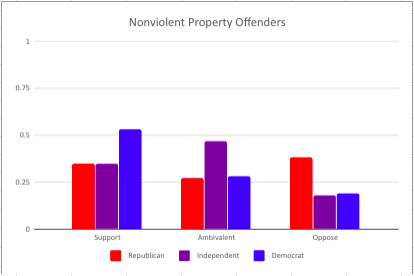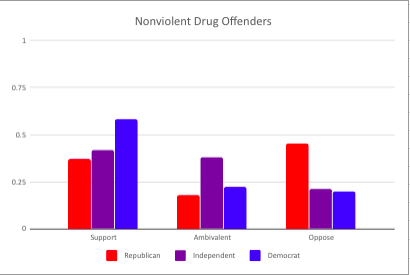Most Americans Support Sentencing Reforms for Nonviolent Offenders — But Political Obstacles Remain
Criminal justice reform has been hailed by politicians and pundits alike as a potential bright spot of bipartisan consensus in today’s polarized, gridlocked political environment. The Committee on Causes and Consequences of High Rates of Incarceration recently concluded that standalone sentencing laws should be changed, because these laws have reduced or eliminated judges’ ability to tailor punishments to the facts and circumstances of each particular crime. Mass incarceration could be reduced if such laws changed. Likewise, many states are reforming their criminal statutes in order to sentence a greater number of nonviolent, first-time offenders to community-based sanctions instead of incarceration. Virtually all community-based sanctions, such as probation or residential drug treatment, are less expensive than incarceration, so this shift could free up resources states have spent on prisons to use instead on crime prevention.
Full consensus on such changes has not been achieved, however. An intra-party split has opened within the governing federal Republican Party over the question of sentencing reform. On the one hand, Senate Judiciary Chairman Chuck Grassley and Senior White House Advisor Jared Kushner lead a coalition pushing for comprehensive justice reform. But on the other hand Attorney General Jeff Sessions has publicly condemned sentencing reform proposals and continues to defend mandatory minimum sentencing for all types of offenders. This GOP division has slowed the momentum of several comprehensive reform bills in Congress and aroused opposition to more modest bills that omit sentencing reforms, such as the First Step Act.
What Do Americans Think?
In late September 2016, I gathered survey data from a nationally-representative sample of White and Black Americans in order to study race, politics, and public opinion about contemporary sentencing reform ideas. To speak to the present debate on Capitol Hill, I asked my respondents to state their support or opposition to key proposals: Should “nonviolent property offenders (who committed crimes like burglary or theft)” and “nonviolent drug offenders (who committed crimes like drug possession or drug selling)” be sentenced to community-based supervision instead of prison in order to save states money?
-
Among my respondents, 47% expressed support for community-based sanctions for property offenders and 51% supported community sanctions for drug offenders. Only 24% of those surveyed opposed these reforms for property offenders and 28% opposed them for drug offenders. The remaining respondents said they “neither support nor oppose” this reform proposal.
-
Separating out respondents by race does not change the results much – 51% of Blacks and 43% of Whites support community-based sanctions for property offenders, and 54% of Blacks and 47% of Whites support them for drug offenders. These findings suggest that only a minority of White and Black Americans share Attorney General Sessions’ opposition to sentencing reform for nonviolent offenders.
-
When respondents are separated out by political partisanship, we see some political support for Sessions’ position. As shown in the graphs below, a plurality of Republican respondents expressed opposition to the use of community-based sanctions instead of incarceration for both types of nonviolent offenders. A majority of Democrats expressed support, while Independents were split. A plurality of Independents expressed ambivalence in regard to property offenders but support for reforms affecting drug offenders. Sessions appears to be speaking for the Republican base in this policy debate, but not for most Democrats and Independents.
Public Support for Community-Based Sanctions Instead of Prison


Mass public policy preferences do not have much policy impact unless they affect votes. In additional analyses, I identified respondents who reported voting in the 2012 presidential election. Since past voting is a strong predictor of future voting, these are the people who are most likely to influence public policy through voting. Among prior voters, 49% expressed support for sentencing property offenders to community-based sanctions, and 51% expressed support for diverting drug offenders away from prison. Both sets of supporters outnumber those who are opposed or ambivalent. Politically-engaged voters clearly support sentencing reform.
For theoretical reasons tied to a larger research project, I only gathered data from non-Hispanic White and Black Americans. However, other studies show that Latinos typically express criminal justice policy preferences more closely aligned to African Americans than Whites. Overall, it seems clear that Attorney General Sessions’ opposition to sentencing reforms for nonviolent offenders is not only at odds with expert opinion, but is also out of line with the views of most Americans outside the core Republican base. There are ample political and empirical reasons for Congress and the states to reexamine sentencing policies in order to curb the growth of mass incarceration.
Read more in Kevin H. Wozniak, “An Analysis of Black-White Racial Differences in Public Support for Nonviolent Sentencing Reform” Race and Justice, (2018).
